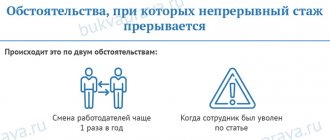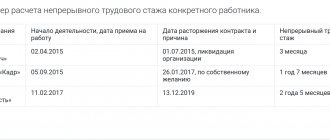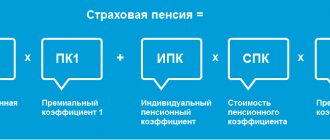What is continuous work experience?
Continuous work experience is the time during which a person worked without interruption, and the period between dismissal and taking a new job did not exceed the periods allowed by law.
It is possible to interrupt your work experience (while maintaining its “continuity”) if the reason is valid. For example, when a child is born, a woman does not actually work in the workplace, but her work experience is not interrupted if she was previously employed. This state of affairs was logical in Soviet times and legislation retained the concept of continuous service until 2006.
Continuity of service was maintained even if the employee quit and got a new job within 1 to 3 months. Also in Soviet times, there was such a thing as “freezing” seniority. For example, when leaving voluntarily, if the family moved to another area in search of work, they were given time to find a job.
In Soviet times, continuous work experience played an important role, as it directly affected the payment of sick leave and the amount of pensions. The law was regulated by Resolution of the Council of Ministers of the USSR dated April 13, 1973 No. 252.
What is included
If we apply the analogy of the rules of law that were in force during the USSR, then continuous work experience should be understood as the total number of years that an employee worked in one organization. At the same time, during the entire working period, the worker could occupy different positions, but was constantly registered with the same manager.
ATTENTION! Previously, continuous work experience also included the time during which an employee could quit one job and move to a new one. The duration of the gap between leaving the previous place and accepting a new one should not exceed 30 days.
In this case, dismissal must be at personal request. When a worker is dismissed under this article, the continuity of work experience ceases.
In special cases, the gap in employment could reach a longer period - 2 months. This happened if the work was performed outside the country or in difficult conditions.
A break of 3 months was allowed in the following situations:
- the worker was laid off from his previous job and was forced to look for a new job;
- My husband was transferred to work in another region of Russia, and the family had to move.
The continuity of work experience during the USSR ensured that an employee with similar experience received various bonuses and pension increases.
For example, continuous work experience in one place for fifteen or more years made it possible to increase pension payments by 10%.
The continuity of work experience also influenced the amount of benefits that were issued in connection with short-term disability.
Nowadays, such length of service includes various breaks that occur in activities, if this is combined with the employee performing essential social functions. destinations:
- decree;
- maternity leave;
- fixed-term, contract-type military service;
- work in the Ministry of Internal Affairs;
- elective work as a deputy of the State Duma.
What changes has the concept of “continuous service” undergone?
In 2006, the Constitutional Court of Russia revoked the above-mentioned document, and the concept of continuous work experience was recognized as inconsistent with the Constitution of the Russian Federation (Article 37). Thus, the court considered that the term “continuous work experience” violates the human right to free work.
Nowadays , there are industries where continuity of work experience is taken into account , but not to the same extent as it was before:
- The length of work experience is taken into account when calculating sick leave, but this does not always happen;
- In a number of professions, seniority plays a role in calculating supplements;
- Employers, on their own initiative, can provide benefits, payments and bonuses to those employees who work in the workplace without interruption;
- Some employers may pay attention to length of service in order to form an opinion about the employee. Naturally, the longer he works in one company, the more reliable he is. But this has nothing to do with legislation.
What is it about
When determining the amount of old-age benefits, the length of service for calculating the pension (PV) is the most important criterion, since the greater it is, the higher the amount of this payment. The main document on the duration of professional activity is the work book, the form of which is determined in Decree of the Government of the Russian Federation of April 16, 2003 No. 225.
Pension experience can be general (now called insurance) and special. The insurance period (SS) is the total time of work taken into account when assigning a labor pension, without taking into account breaks in it, when insurance contributions were received by the Pension Fund of the Russian Federation, plus other periods that are listed in Art. 11 Federal Law dated December 17, 2001 No. 173.
This is important to know: How much work experience does a woman need to retire?
Special length of service is the total time of labor practice (excluding breaks in it):
- in certain positions (for example, teachers in children's institutions need a minimum of 25 years of service to receive payments from the state; doctors working in rural areas - 25, and 30 - for those who work in the city);
- in specific industries (for military personnel - 25 years, sometimes they use mixed experience for a pension in the Ministry of Internal Affairs);
- in specific conditions - dangerous or harmful (for example, on ships of the Marine Fleet of the fishing industry for men - 25, women - 20);
- in established areas (in the Far North - 15 years).
A separate type of special vehicle is length of service - a set duration of work, the achievement of which allows you to receive pension payments upon dismissal from work, regardless of age. Length of service is used, for example, by men and women working in civil aviation flight crews, for whom it is equal to 25 and 20 years, respectively.
Continuous work experience: how it is taken into account
Nowadays, what length of service is considered continuous has changed. According to the provisions of the Labor Code of the Russian Federation, this is the period during which the employee worked in the same enterprise. Not a single article of the Labor Code of the Russian Federation directly indicates this, but there is an indirect mention in Article 121 of the Labor Code of the Russian Federation.
Note that the duration of work in one company no longer affects the amount of sick leave and the amount of pension. The only advantage is allowances and benefits in a number of professional areas.
For example, teachers and medical workers receive bonuses for many years of work in their field of activity. Also, salary increases are given to those living in the Far North and equivalent regions (Order of the Ministry of Labor of the RSFSR dated November 22, 1990 No. 3):
- Arhangelsk region;
- Irkutsk region;
- Chita region;
- Republic of Karelia;
- Komi Republic;
- The Republic of Buryatia;
- Tyva Republic;
- Southern regions of the Far East and Krasnoyarsk Territory.
When can seniority be interrupted upon dismissal?
The work experience is interrupted if the employee is fired due to one of the following reasons:
- systematic failure to fulfill official duties in accordance with the contract, job description or company regulations;
- for absenteeism, which amounted to absence from the workplace for more than 4 hours;
- for appearing at work while intoxicated;
- if the employee has been convicted (imprisonment, correctional labor) and the punishment excludes the possibility of further working in the company;
- the employee committed theft at the enterprise;
- an employee performing educational functions has committed an immoral act in the workplace and can no longer continue to work there;
- management imposed a disciplinary sanction on the worker;
- other behavior of the employee, for which dismissal is due as a disciplinary measure.
When does seniority last?
Based on today’s provisions of the Labor Code of the Russian Federation, continuous length of service is the duration of an employee’s work with one employer. It is defined in days, calendar months and years. The duration and continuity of work experience is noted in the work book.
If an employee resigns, continuity of service is lost. State employees, in particular teachers and doctors, may act as an exception. If they remain working in the same structure and field, changing only the institution, the length of service is not interrupted. When calculating a salary bonus, previously worked time is taken into account.
According to the Law of the Russian Federation of April 19, 1991 No. 1032-1, the length of service is also retained in the following cases:
- time of official unemployment with benefits;
- the period of secondary and higher education for which the scholarship was paid;
- performing public works for a fee;
- moving to another city to get a job on the recommendation of the employment center;
- temporary disability with official confirmation;
- maternity leave time;
- being in military service/training;
- participation in preparatory activities for military service/alternative civil service;
- election to a position in the legislative branch, for example, as a deputy.
More about points for retirement
In 2021, the minimum requirements for retirement are as follows: at least 10 years of work experience, 55 individual points accumulated. But these indicators may not be enough for a stable economic situation in the country. Then next year the numbers will increase.
Table for calculating the retirement age on a general basis
IPC is the designation of the individual pension coefficient. It includes three main indicators:
- Insurance experience.
- Points specified by law.
- Reaching a certain age.
The more points a citizen has by a certain age, the higher the amount of compensation will be. Average wages over the past few years also affect the result.
Pension points are calculated simply. To do this, the average salary for a certain time is multiplied by the percentage of contributions to the Pension Fund. The employer must provide its employees with relevant information every month. The controlling body studies the information and makes calculations.
Problems may arise only for citizens who worked in the 1990s. Much information has been lost regarding the organizations operating at that time. You can prove your experience only by presenting your work book.
How to calculate length of service using a work book?
The rules for calculating continuous work experience are quite simple. The basis for its calculation are the following documents:
- contract or work agreements;
- employment history;
- certificates from places of work;
- military ID.
When calculating, we first add up the time worked in each company, and then add up the periods if the breaks did not exceed the duration established by law (or occurred for a good reason).
What does continuous work experience affect?
Currently, continuous work experience affects 2 areas:
- when assigning salary bonuses (for medical employees and teachers);
- when calculating benefits for temporary disability, although in most cases the insurance period is used for calculation.
However, in a number of cases, if the duration of the insurance period is less than the duration of continuous work experience, the work experience can be taken to calculate benefits.
Changes in the role of seniority for pensions
Compared to the previous system of calculating pensions, the emphasis has been shifted to income and accompanying payments of contributions to the Pension Fund, and the role of length of service has been significantly reduced.
But the length of service retained the significance of the condition necessary to receive a labor (insurance) pension.
It also becomes important at the moment when retirement age approaches: if you continue to work without applying for a pension, then its value can be significantly increased.
The importance of length of service for pensions was described in detail by Federal Law No. 400 of December 28, 2013, in particular, Chapter 3, which is entirely devoted to the length of service.
Then the insurance period appeared, including its minimum value, which ensures the right to receive an insurance pension.
Its absence will result in receiving only a social pension, but its payments will begin to arrive no earlier than in 5 years, with the onset of the age established by the pension reform (this takes into account all transitions in the period of validity of the new law - from this year to 2023.
Those. depending on the year of the reform – first, second, ... the citizen’s retirement age is determined, social benefits are calculated and it is announced when he will be able to receive it).
- This year, women will receive social benefits at 55.5, men at 60.5.
- Next year, social pensions will be issued to citizens aged 56.5 and 62 years.
- At the end of the reform period, in 2023, and its final provisions are fixed, women will receive old-age social benefits at 60, and men at 65.
Regional allowances will bring the amount of social benefits up to the minimum subsistence level established in the citizen’s place of residence.
The work experience accumulated after registration of SNILS does not need confirmation, and this is a big plus for citizens. The Pension Fund, having a database of pension contributions, fully has the necessary information.
Does continuous work experience affect the size of the pension?
During the Soviet Union, continuous work experience was one of the key criteria when calculating pensions. To date, this parameter does not have a serious impact on the calculation of pensions. But there is an exception here too - if the total insurance period of a person is less than continuous work activity, then the larger value is taken as the basis for the calculation.
Thus, the term “continuous work experience” will completely disappear over time, since it has been replaced by a new concept - “insurance period”. And now the registration of a citizen in the pension insurance system plays a big role. If an employer pays insurance contributions to the Pension Fund for an employee, the citizen develops an “insurance record.”
There is currently no increase in pensions for long periods of work at one enterprise. It is more important that the salary is official, and the employer makes insurance payments from it.
Even if a person works in one company for a long period of time, but receives his salary in an envelope, the transfers to his account in the Pension Fund of the Russian Federation are too small. This means that you should not count on a decent pension.
About additional requirements when receiving a pension
For calculating old-age insurance benefits, length of service is an important, but not the only condition. You must reach a certain age. And collect so-called individual pension points.
Under normal conditions, until pension reform began to be developed, a woman could retire at age 55. If you are planning to retire in the first half of 2019, the time to apply for a vacation is postponed by 0.5 years.
Pension points are a kind of rating that reflects how actively a person has invested in his future pension. Payment of insurance premiums throughout all years is carefully studied, only after which a final decision is made.
Starting from 2015, the minimum number of points is also increased gradually. It is planned that by 2025 the figure will be 30. 16.2 is the minimum level for citizens at present.










